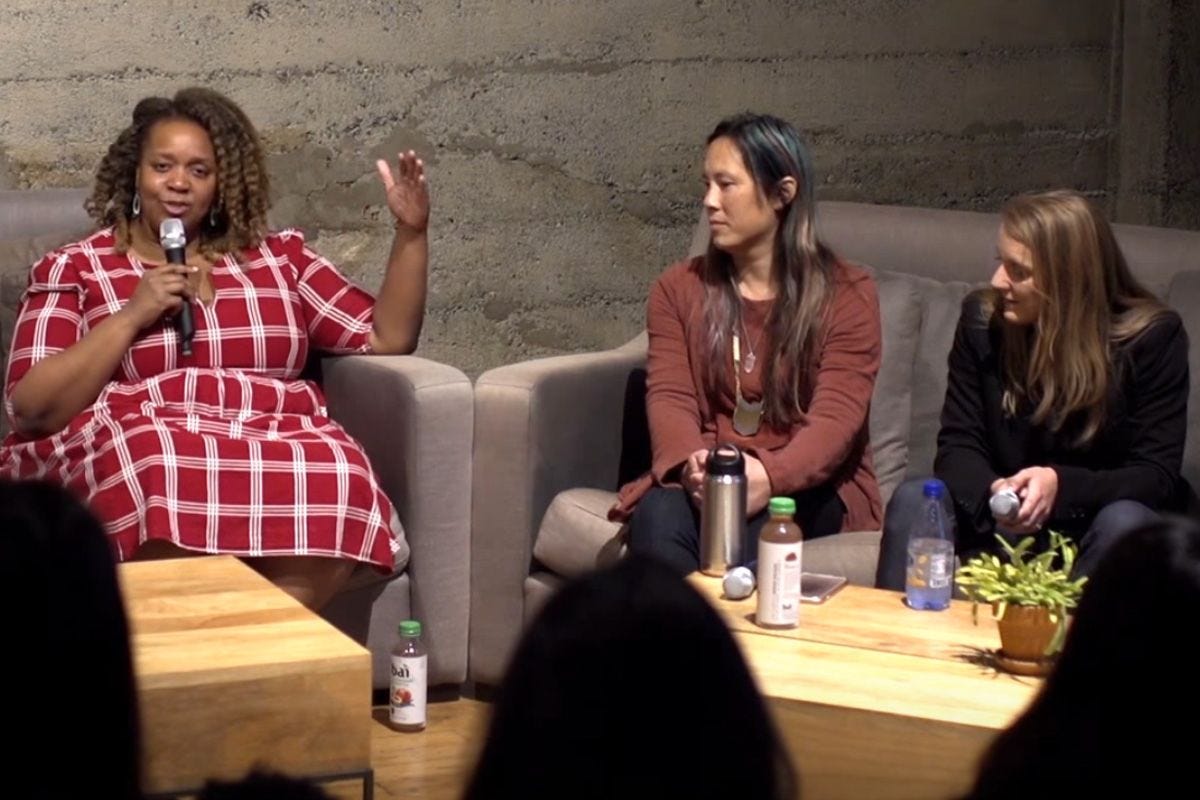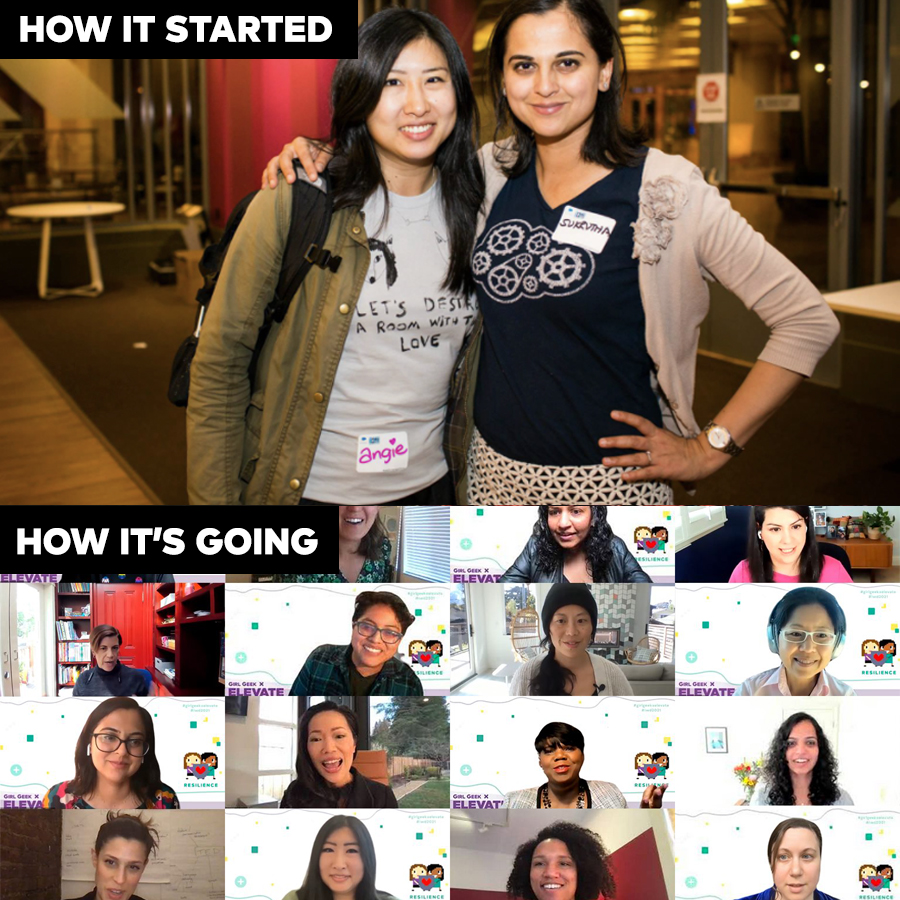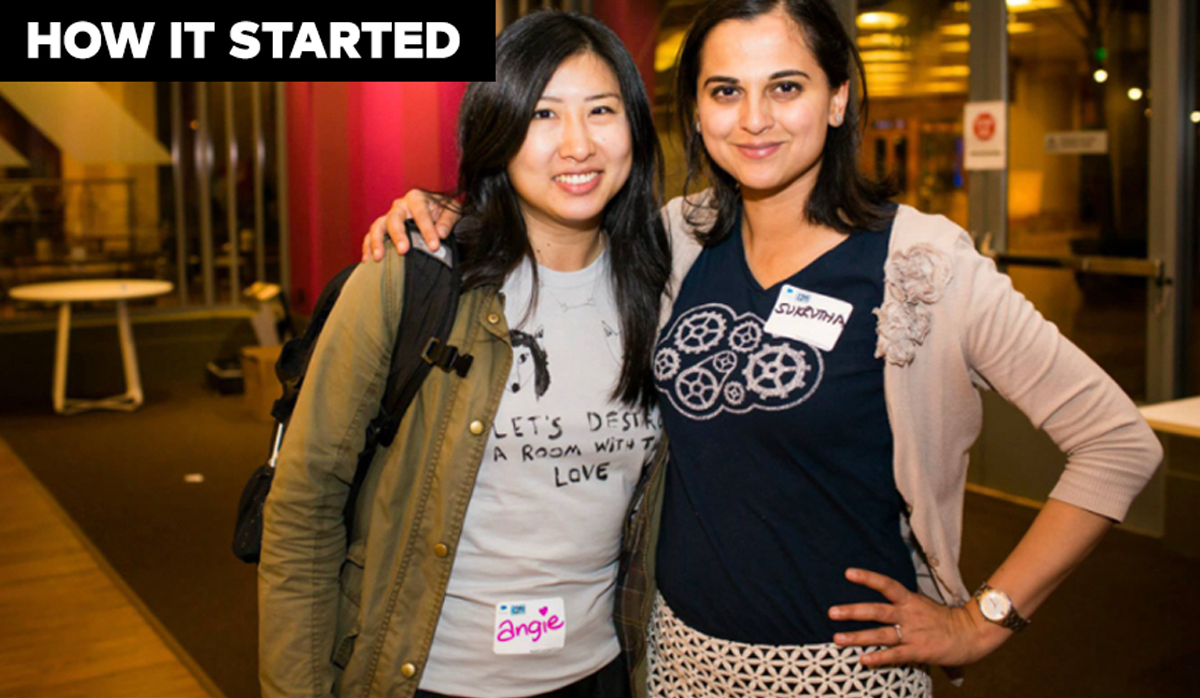The key to resilience with a career in tech is your network, especially for women and introverts. Here are strategies from the Girl Geek X community for maintaining trajectory of jobs, careers, passion projects, and more.
#1 — Leverage the buddy system
For the past decade, Sukrutha Bhadouria and Angie Chang have carpooled together to Girl Geek Dinners, from San Francisco to San Jose, when schedules align. This makes sitting in traffic almost enjoyable as we happily catch up about family and friends, work, and more. At Girl Geek Dinners, we stay abreast on current technology trends and the latest career advice for women in tech.
Meeting interesting new people at inclusive women’s events is easier to do than you think. Some confess they are dreaming of working elsewhere but are afraid of making the leap. Some inspire us to do more with our time and abilities. Some remind us how we can do better. Onstage, executives and engineers take turns on the microphone sharing best practices, giving lightning tech talks, and hosting panel discussions. You can listen and learn intently, or sit back (because talks are recorded for Girl Geek X’s YouTube channel) while your brain processes a work problem with a welcome change of scenery. Also, be sure to check out the company’s snack, beverage and women’s toiletries collections before leaving with some company swag.
Girl Geek Dinners are a force multiplier — a safe, inclusive “third place” apart from work and home, to recharge and recoup. Staying in touch with people you meet shouldn’t be a chore to sweat over — just add new friends on your preferred social networks because you just never know when you may want to drop them a note.
#2 — Do the work & communicate it
A common feeling in tech workplaces is that men are promoted at higher rates than their female counterparts. Doing excellent work will not be rewarded by more pay and a better job title.
Women succeed by rigorously communicating progress and learnings — from writing and sharing lists of accomplishments, and asking regularly about getting that promotion:
“Never in my professional career had a situation, I mean NEVER, had a situation where a manager has said, ‘Great, Arquay, you’re doing awesome. Time to promote you to the next level.’ Every single promotion that I’ve ever gotten has been me saying — ‘I am operating at this level. I’ve done all of these things, and I think I’m ready for the next level and here is why’ and you hand this [accomplishments list] to your manager and have a conversation with your manager to demonstrate these things.” — Arquay Harris, VP of Engineering at Webflow

Transparency is key for companies: provide regular audits and share promotion rates across gender and race for every promotion cycle and level. Industry leader Salesforce audits employees salaries annually then spends millions to reconcile any gender or racial discrepancies in employees pay, and shares annual Equality data and quarterly Equality updates.
People of color leave tech workplaces in droves citing unfairness. Such high rates of turnover ring up a $16 billion a year problem for the tech industry:
“Tech companies spend millions of dollars finding, recruiting and onboarding top-level talent, but the data show they must focus real attention on retaining the talent they’ve got. Unfair, non-inclusive and subtly-toxic cultures drive people out, and the trends are particularly pronounced for women, LGBTQ employees, and underrepresented people of color.” — Dr. Allison Scott, lead author of Kapor Center’s Tech Leavers Study
The Tech Leavers Study quotes female engineers who reported about the unfair promotions, and Black employees who bristled at being called “diversity hires” and being otherwise other-ed in the workplace. Diversity and inclusion trainings have always been in the toolkit for corporate HR to leverage, and while the Black Lives Matter movement rallied white people to utilize their privilege to dismantle systems that oppress other groups and increased awareness for equity globally, myriad organizers are still working on elements for long-term, systemic change in the world.
By attending Girl Geek Dinners, women can investigate alternate workplaces that may have better work cultures and different coworkers / managers, and meet more women in tech who will refer fellow girl geeks to their next job. Because Ally is a verb.
#3 — Move those goal posts
We’ve heard that what got you here won’t get you there, but how can you find role models for new goals, ambitions, and careers? If you don’t work at a company with tens of thousands of employees to provide dozens of women executives to look up to, Girl Geek Dinners hosted at various companies provides an endless parade of role models — speakers — with tables of girl geeks sharing their experiences, challenges, and connecting over dinner over shared experiences.
Learning to move her goal posts at work is a winning plan for Sukrutha Bhadouria, who has been managing high-performing teams at Salesforce for seven years. She was recently promoted to Director of Engineering, and welcomed the good news as she eased back into work from taking parental leave.
Sukrutha reflected on how her mindset has shifted over the years:
“I was so burned out after grad school, so I coasted for a few years. I started to see people zip past me, and I realized that I needed to find new goals to achieve, and once I achieve them, find more goals, rinse and repeat. My advice is to always look ahead at your goals, but when you get close, don’t underestimate the achievement. Take a moment to reflect on how far you’ve come. Then look ahead again and fight to the finish line!” — Sukrutha Bhadouria, Director of Engineering at Salesforce
If you’re facing a particularly tough challenge at work, you may benefit from enlisting some help. Some employers provide or subsidize the cost for professional development thru third-party coaches who work with underrepresented groups (minorities, women) to move up corporate ladders, reported NPR. This is important because all-white and all-male executive boards and executive teams are common, visible, and troublesome symbols of company cultures that are ripe for transformation.
Minji Wong coaches executives at Fortune 500 companies for decades, and focuses on coaching Asian women leaders. Through discovery, her clients find that 80% of challenges lie in misalignment of their strategic leadership vision- and how it’s embodied, expressed, and perceived by their teammates. For Asian-American women, making the most of your Asian assets at work means reconciling traits like humility and work ethic with what works in American workplaces. You can find yourself in a cycle of frustration and resentment you learn that assertiveness and informal relationships catalyze career growth, not simply doing excellent work.
“To bridge gaps between expectations and behaviors, Asian leaders benefit from understanding how they show up at work. Self awareness of gaps between your intended leadership brand and how it actually lands is critical for career ascension and success.” — Minji Wong, executive coach, At Her Best
She works with individuals to “identify the top behaviors or actions necessary in order to be seen, felt and heard by others. Common themes include taking up space and self authorization. Being aware of intersectionality in gender/race and taking action is critical for career success.”
Leading authentically lets others to see who you are, so they can more fully understand your point of view, bringing detractors to your side.
Asians in tech hold a unique “mix of privilege and exclusion that gives us just enough power to speak up but not enough to gain equitable access to opportunities and safety,” write Ellen Pao and Tracy Chou — “It’s no coincidence that those who initiated the first wave of lawsuits against tech monoliths (Kleiner Perkins, Facebook, and Twitter)” and that those who called out investors for harassment were almost all Asian women.
Asians are privileged, yet excluded, especially in the leadership ranks. “Having a glass ceiling to break through is a privilege” states Sheree Atcheson in Forbes. “Many women do not have the privilege of having a glass ceiling to break. Do not forget that glass ceilings exist for some women, whilst concrete roofs exist for others.”
Research from Ascend foundation has found: “From a racial perspective, Executive Parity Index analysis shows Whites overall are overrepresented in the Executive level, while all minority races are underrepresented at the Executive level, with Asians and Blacks the least likely to be Executives. Asian women and Black women are the least likely of all cohorts to be Executives.”

For the time being, the onus is still on the individual to do the work and be recognized by management as a high-potential candidate for promotion. Companies may have a budget for leadership development, bringing in executive and career coaches to support their ambitious new leaders. You can also tap an executive coach to work outside the corporate structure and get that development work done for yourself.
And if you find yourself feeling burned out, depressed, or always irritated or angry, consider enlisting support from a licensed therapist for a short-term or long-term goal. Therapists work with people facing a wide variety of struggles, from depression, anxiety and trauma to trouble with relationships, multicultural issues and difficult life transitions.
“I like to focus on micro-progressions. People beat themselves up as they come in and want to make change, and they want to change faster than they are. The 25-year habit they want to change needs more time, self-compassion and self-realization of micro-progression. Let’s say, you are a big spender — celebrate that moment of hesitation when shopping online, and reflect back that, hey, you did think about making a different decision and didn’t, but that didn’t used to happen before, acknowledge that growing self-awareness.” — Nicole Chung, PsyD, licensed therapist
Many women have found EMDR therapy beneficial and proven in treating PTSD from work and other traumas, so they can rewire the brain and resume living full lives.
Support groups (facilitated in Facebook groups for people of a certain job title, recovery from addictions, or health afflictions) can be helpful in providing feedback and camaraderie. Whether you’re silently struggling with infertility or being a new mom, there are folks who understand where you’re coming from, and will empathize — and maybe share a tip on what has worked for them in their journey.
Girl Geek X Community: Have you overcome a personal/professional challenge, or want to share a story about a transformative experience?
Please email us at hello@girlgeek.io — we’d love to hear your story. If you haven’t solved a problem yet, and want to share your current challenge, email us too! While we may not be able to personally respond to every email, please know we will read every single one of them. Thank you in advance!

Join the Girl Geek X community at Facebook and sign up for our email newsletter for events!



